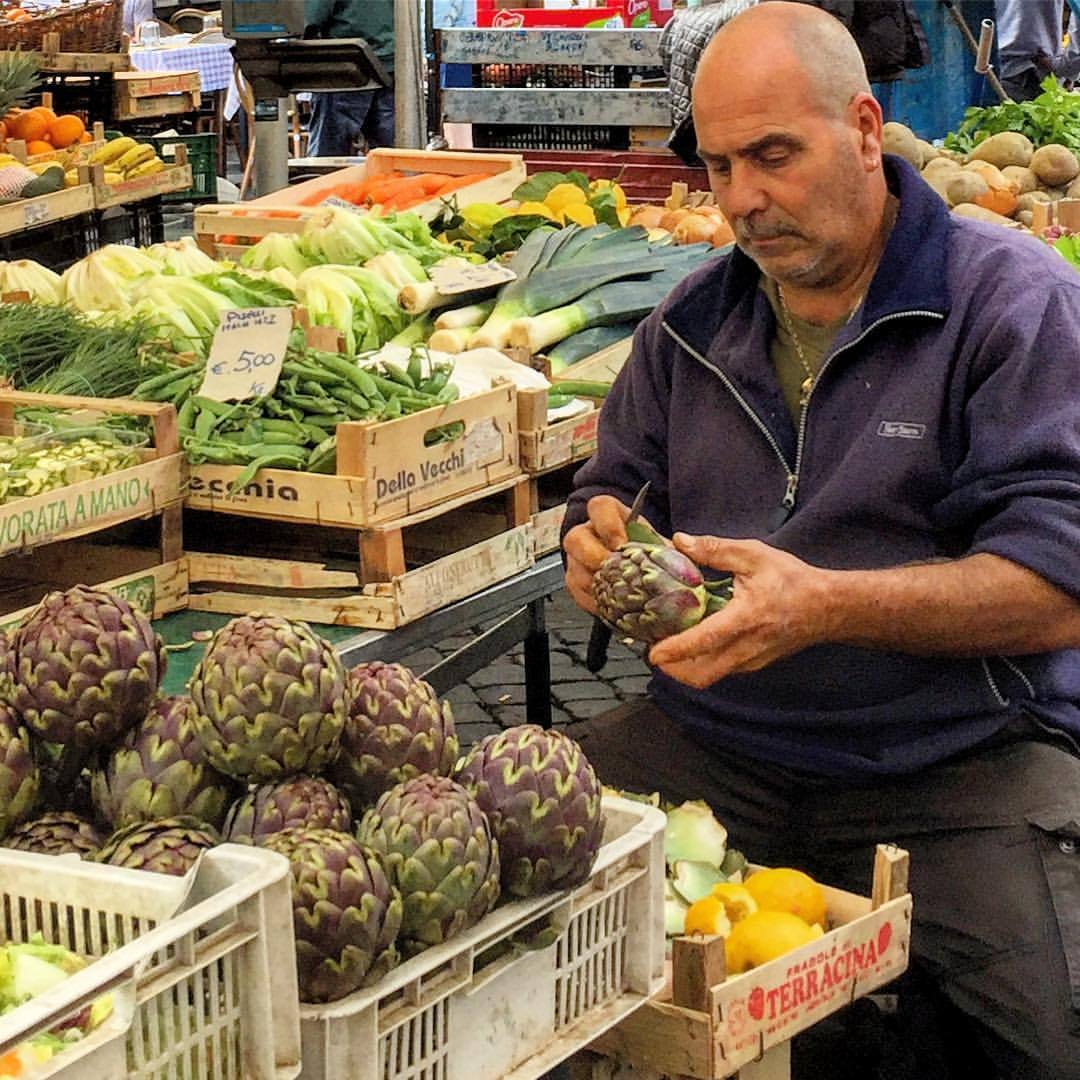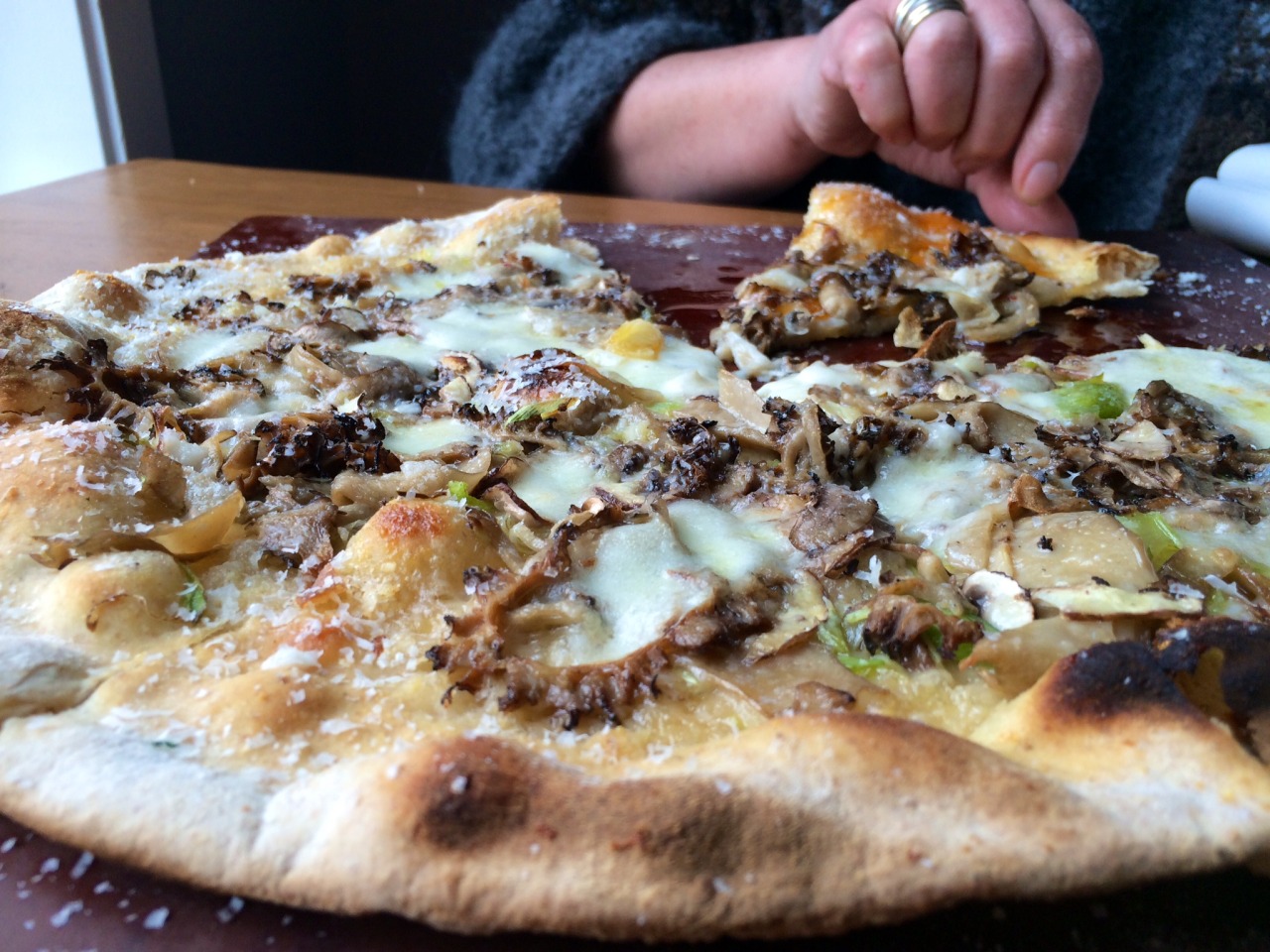Calamari on the grill.
-
#spain #barcelona #food #tapas #cantstopeating (at Barcelona, Spain)
Before the rain and after the fires,
dozens of laden pepper plants were late to be liberated of their fruit, now overripe and packing some serious BTUs. Habanero and Serrano and Ghost and Aji and red Padron peppers were de-stemmed and blended with dozens and dozens of cloves of Susanville garlic, agave and sea salt. Left to ferment for five days before separating the jus (for Sriracha) from the pulp (for Simbal). A stir each day releases its exotic, heady aromas into the air, making me long for a wood-fired, thick-cut pork chop on which to slather this 🌶 paste from hell.
-
#garden #hotpeppers #food #hotasfuck (at At Home in Napa)
Winter rains finally cease
and morning broke
with azure sky and silver lining clouds
the color of young lambs’ wool.
Aromas of soaked earth
dank manure
the tang of blood and mineral
fill the nose,
awakening the senses
to the reality of farm life.
One Shot John
a master artisan
of mobile slaughter
the last of his kind
true to his moniker
laid to rest
the 216 pound pig
a mix of Berkshire, Duroc and Red Wattle
quickly, cleanly, humanely
without instilling terror of transport
from her land.
The rifle’s pop
ricocheted through bosomy hills
scattering the blackbirds
to escort her energy
to the heavens,
sending shivers of gratitude
and remorse
through my being.
With a silent nod,
quick dispatch and little fanfare,
she was washed
shaved
and eviscerated;
the heart and kidneys to be pan-fried
the liver made into pâté
by hands more talented than my own,
never a morsel wasted.
Knives sharpened
towels cleaned
table scrubbed
spices gathered and toasted
grinder and casings at the ready,
the butchery begins in two days time
a macabre ritual
of life
and death
and sustenance.
#farming #pig #food
(at Hudson Vineyards)
Sweet red onions (cipolla rossa di Tropea) from Calabria, Italy; thousands of years beloved for their flavors, as well as their healthful properties. Sown in clay cliffs overlooking the impossibly green Tyrrhenian Sea, these allium beauties are tended by hand under the searing summer sun of Tropea. They even boast their own Protected Designation of Origin.
#italy #food #onion #calabria
Roasting Wild Ducks
Hunting duck requires great fortitude. Sitting in a cold, wet duck blind fighting boredom while waiting for a fly-over challenges steadfastness, the trigger finger frozen into a bluish hook. After such expended effort, I try not to fuck up the preparation of such magnificent, hard-won creatures in the kitchen, which includes triple-checking the birds for shotgun shrapnel, ensuring no mastication of metal at the dinner table.
Know your duck: mallard, teal, pintail and wood duck are succulent roasters. Diver ducks are best avoided, tasting only of dank arse. Fresh duck is most desirable, its quack a very recent memory. After freezing, the meat toughens and tastes more distinctly of the earthy minerality of blood and liver, powerful flavors prized primarily by the heartiest of northern European hunters. To counter the strong taste, the birds are brined in lightly salted water with brown sugar, rosemary and black peppercorns for a couple of days, leeching out blood and its gamier flavors, and sealing in deliciousness.
Ducks and geese have a thick layer of fat beneath their skin and feathers, which keeps them warm and upright on the water. Anywhere but in the kitchen, the feathers are plucked only to the down coat, and then the bird is dipped first into a hot bath of paraffin wax, and then into a cold water bath, which sets the wax. Once hardened, the paraffin is gently peeled away from the bird, taking with it the remaining feathers, revealing the duck’s satiny skin. With a very sharp paring knife, the skin is gently pierced without cutting into the flesh, which allows the fat to drain away from the roasting birds without drying their meat. Scalding water is then poured over the birds to tighten the skin, so it crisps to shades of antique mahogany. Rosemary, garlic, and Meyer lemon are tucked into the cavity of one duck, while toasted cumin seed, garlic, and quartered orange are tucked into the other.
At noon, dried pine cones are wrapped in the sad headlines of an old Sunday paper and laid amongst seasoned oak, inciting a blaze whose coals will be a few degrees cooler than Hades by late afternoon; the perfect conditions for roasting both waterfowl and upland game. The birds can be tied and hung over a fireplace to slowly turn, but in the wood oven, I’ve arranged them across an elevated iron grate near the coals. A cast iron skillet laid thick with fingerling potatoes and whole baby cipollini onions is situated underneath the birds to catch each precious drip of duck fat, slowly frying the spuds in the greasy goodness.
Simmering and bubbling in a heavy ceramic pot nestled into the fire’s ashes, the ducks’ offal and necks are submerged in a slush of wine and water laced with herbs, dried currants, orange peel, and a healthy shot of Madeira. The birds are basted religiously with this aromatic nectar, watching for the skin to crisp but not burn. Roasting for more than two hours, the ducks are finally cooked to medium rare (165 degrees). While the birds rest away from the fire, the meat is removed from the necks and chopped finely along with the offal and fruit. This gamey-sweet goodness is tossed with wild rice, the black grains of grass cooked to al dente. Bitter red and white chicories have been cleaned and torn into an ancient burl wood bowl, and laid with tiny slices of clementine orange, fragrant of California winter, and toasted hazelnuts carted home from northern Italy and pestled into pieces.
The ducks’ breasts, the rosy-reddish hue of a wild, late summer rose, are sliced thick and drizzled with the remaining basting jus, now rich and unctuous. The cork is pulled on an old Clape Cornas, long desired but heartbreakingly cork-tainted, before opening a Big Table Pinot Noir from Willamette Valley in Oregon; its dark earth, forest, and lingering brightness a fitting reflection of the duck’s long journey to our table.
She warned me in a rather snotty manner that it would cost more money. I peered at her over the top of my eyeglasses, dramatically setting aside the Sunday Styles section of the paper in which I had been so thoroughly absorbed.
“Then it better be a damn fine pie.”
A standing mid-week lunch date provided an excuse to drive the long route through the Napa Valley, over the hills of Calistoga and into western Sonoma, eyes peeled for hawks, budding vines, and spring wildflowers. Seersucker blue skies were striped with heavy silver clouds, inciting our giddiness at the possibility of rain falling on drought-plagued soils.
Before stocking up on Sonoma’s bounty (honey from an on-your-honor farm-stand, a couple quarters of Blue Dream from the happy hippy clinic, and several bunches of broccoli rabe from nearby fields), we hunkered down for lunch. The modest, glass-enclosed dining room faced a large open kitchen, which spoke to cooking rather than preening, its shelves lined with mason jars containing colorful herbs, spices, fermentation projects, preserves, and various grains. A stout woman with long dark hair rolled out dough with her thick hands, while two lanky men manned a large stove, practiced acrobats maneuvering banged-up skillets between all eight burners.
Our heated, ripped-from-the-headlines discussions about the Middle East, corruption in Congress, and the plight of California immediately ceased as plates were set before us. Setting aside both the Week in Review and our wildly differing opinions, I reached for the bottle of house-made chili oil, infused to the color of our state flower.
Fresh spring morels, of which I had requested extra, were foraged the day prior from the Sierra Nevada Mountains and lovingly transported to this corner of Sonoma on large rattan baskets. The mushroom’s combs were chopped and cooked quickly in salted butter and decent white wine, retaining their toothsome texture and crowning their California earthiness with a French beret. Wiping her hands on her apron, the woman spread the fungi across the dough she’d been working, and then stippled it with pungent green garlic, snow-white ricotta, and Reggiano grated from a two fists-sized block. She slid the dough masterfully off the peel onto the floor of the stone hearth, retrieving it just as the cheese bubbled, and the edges of the crust singed to divine crunch.















